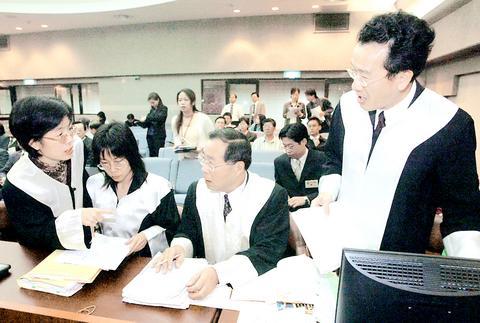Attorneys for The Journalist magazine yesterday tried to persuade Supreme Court judges that the Constitution covers both criminal and civil cases, while Vice Presi-dent Annette Lu's (
To decide whether the verdict of the libel suit brought by Lu against The Journalist should be upheld or the Taiwan High Court should rehear it, the Supreme Court's Civil Department yesterday held a debate for the two sides' lawyers to defend their arguments and try to persuade five Supreme Court Judges -- Lin Chi-fu (

PHOTO: TAIPEI NEWS PHOTOGRAPHER ASSOCIATION
Lu sued the magazine for publishing a story in November 2000 that said she had called its editor-in-chief to spread a rumor that President Chen Shui-bian (陳水扁) was having an affair with one of his aides.
The judges did not summon Lu or any of the defendants, but the magazine's president, Wang Chien-chuang (
Lu's five attorneys are all familiar faces who have frequently defended the Democratic Progressive Party (DPP) and its members, including Wellington Koo (
Koo and Hung are also repre-senting the DPP in the lawsuit brought by the Chinese Nationalist Party (KMT)-People First Party alliance requesting a recount of the March 20 election ballots.
The Journalist was represented by Lo Ming-tung (
Lo said that Articles 11 and 22 of the Constitution should cover the case and that was why the magazine decided to appeal the verdict.
Article 11 states, "The people shall have freedom of speech, teaching, writing and publication."
Article 22 says, "All other freedoms and rights of the people that are not detrimental to social order or public welfare shall be guaranteed under the Constitution."
"Reporters are responsible for reporting, not investigating," Lo said.
Lo also declared: "It is impossible for reporters to come up with `100 percent accurate' stories."
"The plaintiff's civil claim could sink the entire magazine since it is quite impossible for it to afford the claim," he said.
In response to Lo's arguments, Koo said his client's bottom line was the demand for an apology.
"Our major argument is to ask for a proper apology. That is all," Koo said.
"We know that the defendants may not be able afford so much, but the second verdict by the high court has marginalized the penalty, did it not? We are merely requesting the defendants to make it up to Lu for the damage they have done," he said.
The debate lasted nearly two and a half hours, but the atmosphere was calm.
Lin, the presiding judge, said that a decision would be announced tomorrow at 10am.
According to Lu's original civil claim, which was upheld by the district court, the defendants -- Wang, editor-in-chief Yang Chao (
The cost of printing such clarifications has been estimated at NT$180 million.
The Taiwan High Court reduced the penalty and ruled that the defendants only needed to buy half-page ads on the front pages of four major Chinese-language newspapers to publish a clarification for one day. That would cost about NT$3.86 million.
The court ruled the clarification did not have to be aired over the radio and TV for three days, taking into account the defendants' in- ability to pay for such a large amount of air time.

An essay competition jointly organized by a local writing society and a publisher affiliated with the Chinese Communist Party (CCP) might have contravened the Act Governing Relations Between the People of the Taiwan Area and the Mainland Area (臺灣地區與大陸地區人民關係條例), the Mainland Affairs Council (MAC) said on Thursday. “In this case, the partner organization is clearly an agency under the CCP’s Fujian Provincial Committee,” MAC Deputy Minister and spokesperson Liang Wen-chieh (梁文傑) said at a news briefing in Taipei. “It also involves bringing Taiwanese students to China with all-expenses-paid arrangements to attend award ceremonies and camps,” Liang said. Those two “characteristics” are typically sufficient

A magnitude 5.9 earthquake that struck about 33km off the coast of Hualien City was the "main shock" in a series of quakes in the area, with aftershocks expected over the next three days, the Central Weather Administration (CWA) said yesterday. Prior to the magnitude 5.9 quake shaking most of Taiwan at 6:53pm yesterday, six other earthquakes stronger than a magnitude of 4, starting with a magnitude 5.5 quake at 6:09pm, occurred in the area. CWA Seismological Center Director Wu Chien-fu (吳健富) confirmed that the quakes were all part of the same series and that the magnitude 5.5 temblor was

The brilliant blue waters, thick foliage and bucolic atmosphere on this seemingly idyllic archipelago deep in the Pacific Ocean belie the key role it now plays in a titanic geopolitical struggle. Palau is again on the front line as China, and the US and its allies prepare their forces in an intensifying contest for control over the Asia-Pacific region. The democratic nation of just 17,000 people hosts US-controlled airstrips and soon-to-be-completed radar installations that the US military describes as “critical” to monitoring vast swathes of water and airspace. It is also a key piece of the second island chain, a string of

The Central Weather Administration has issued a heat alert for southeastern Taiwan, warning of temperatures as high as 36°C today, while alerting some coastal areas of strong winds later in the day. Kaohsiung’s Neimen District (內門) and Pingtung County’s Neipu Township (內埔) are under an orange heat alert, which warns of temperatures as high as 36°C for three consecutive days, the CWA said, citing southwest winds. The heat would also extend to Tainan’s Nansi (楠西) and Yujing (玉井) districts, as well as Pingtung’s Gaoshu (高樹), Yanpu (鹽埔) and Majia (瑪家) townships, it said, forecasting highs of up to 36°C in those areas